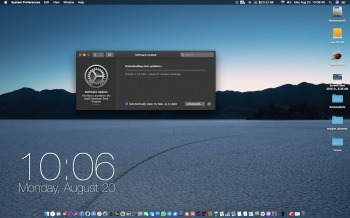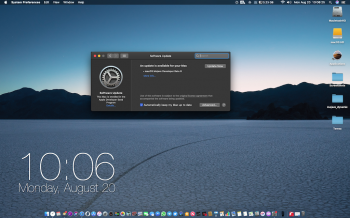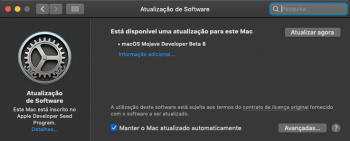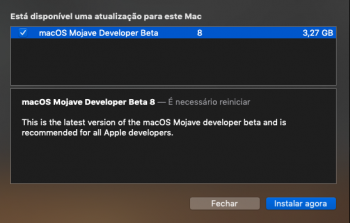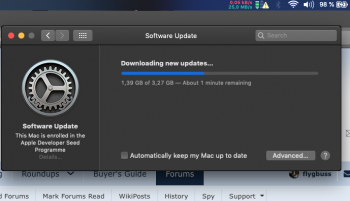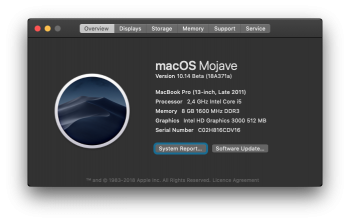I have a question, every time a new build comes out, should I use the patcher and do the whole process again? I'm running an iMac 27 i7 late 2011.
Got a tip for us?
Let us know
Become a MacRumors Supporter for $50/year with no ads, ability to filter front page stories, and private forums.
macOS 10.14 Mojave on Unsupported Macs Thread
- Thread starter dosdude1
- WikiPost WikiPost
- Start date
- Sort by reaction score
You are using an out of date browser. It may not display this or other websites correctly.
You should upgrade or use an alternative browser.
You should upgrade or use an alternative browser.
- Status
- The first post of this thread is a WikiPost and can be edited by anyone with the appropiate permissions. Your edits will be public.
I have a question, every time a new build comes out, should I use the patcher and do the whole process again? I'm running an iMac 27 i7 late 2011.
If you update only, yes, should do the patches again with you USB stick. If you can't update. You will have to make a brand new installation as you did before and apply post installation patches.
[doublepost=1534766988][/doublepost]
Agree, in "light mode" also the Launchpad, Mission Control, Dashboard, Notification Center and the Applications "comic cloud" transparencies are fine, the fact is that not exactly only Finder is affected, also Safari's Favorites main page, and maybe any other app that lays on finder's windows drawing. As known Finder is the cell in MacOS, so I guess the problem is wider.
edit:
Anyway you're right, apart menu bar, are affected to flat grey only certain Finder zones: context menu, some side panels, so I'd say the issue could be bordered.
Have you already tryed to replace Mojave Finder for the HS? Maybe you already did.. just curious.
@flygbuss I investigated the Quartz Composer screensavers thing a bit more. It seems like no QTZ screensavers run on Mojave. Even ones copied from High Sierra's /System/Library/Screen Savers/. The old ones that used to run on Quartz, like Arabesque and Word of the Day have been ported to .saver files like the rest.
I'm not a developer so I don't have access to the Mojave release notes. Not sure if this is a bug or an intentional removal/deprecation but this is an entirely different issue you should bring up with Apple.
I saw that all of the screen savers have been updated to .saver files as well. So I assume they 'officially' dropped the .qtz support. I'm gonna report in anyways. But is there a consumer way to update third party .qtz files to .saver files?
Thanks for your investigation!
[doublepost=1534767602][/doublepost]
The boot rom patched ran no issues, it’s when I used the software update pane in system preferences after converting to apfs that the updater did not work (DP6>DP7), tried two times, ended up corrupting the OS and eventually the disk itself. So I was just trying to see if it will work from DP7 to DP8.
Software Update did show me the last update (DP7) but the installation broke my OS.
(SIP disabled, Patches via boot stick applied afterwards)
I'm on a MBP 8,1 so no APFS patch needed.
I'm gonna give it another try when DP8 arrives but I don't think that issue is connected to the APFS ROM Patcher.
If you update only, yes, should do the patches again with you USB stick. If you can't update. You will have to make a brand new installation as you did before and apply post installation patches.
[doublepost=1534766988][/doublepost]
Have you already tryed to replace Mojave Finder for the HS? Maybe you already did.. just curious.
Tried upon your suggestion replacing the /S/L/CoreServices/Finder.app from HS into Mojave
Finder.app HS 10.13.6 about 30 MB
Finder.app Mojave beta 6 about 25 MB
Using the HS Finder.app will work in Mojave even in dark mode, but in light mode there are the same flat greyed Finder zones instead of transparencies.
A weird fact even if Finder.app is taken from 10.13.6 it results in Mojave (and HS too) in about the Finder as 10.13.5 version. While the Finder.app in any Mojave till now has 10.14 generic version.
Anyway discovering Finder app packages is interesting.
Tried upon your suggestion replacing the /S/L/CoreServices/Finder.app from HS into Mojave
Finder.app HS 10.13.6 about 30 MB
Finder.app Mojave beta 6 about 25 MB
Using the HS Finder.app will work in Mojave even in dark mode, but in light mode there are the same flat greyed Finder zones instead of transparencies.
A weird fact even if Finder.app is taken from 10.13.6 it results in Mojave (and HS too) in about the Finder as 10.13.5 version.
So, someone published here some code and the difference he saw between dark mode and light mode... Maybe, comparing this light mode code, between Mojave and the high Sierra one and see what is different between them... I am downloading high Sierra right now to try some things...
[doublepost=1534771898][/doublepost]
Tried upon your suggestion replacing the /S/L/CoreServices/Finder.app from HS into Mojave
Finder.app HS 10.13.6 about 30 MB
Finder.app Mojave beta 6 about 25 MB
Using the HS Finder.app will work in Mojave even in dark mode, but in light mode there are the same flat greyed Finder zones instead of transparencies.
A weird fact even if Finder.app is taken from 10.13.6 it results in Mojave (and HS too) in about the Finder as 10.13.5 version. While the Finder.app in any Mojave till now has 10.14 generic version.
Anyway discovering Finder app packages is interesting.
And comparing what makes Dock transparency code to the Finder light mode code? Do you know the exactly files about transparency in Dock and Finder? Maybe there is something in common analyzing that.. They should share the same path to reach transparency, no? But in Finder, there must be an error in that path. I think.
I'm the one who published some code comparing the two modes. I'm comparing various frameworks in HS versus Mojave.So, someone published here some code and the difference he saw between dark mode and light mode... Maybe, comparing this light mode code, between Mojave and the high Sierra one and see what is different between them... I am downloading high Sierra right now to try some things...
[doublepost=1534771898][/doublepost]
And comparing what makes Dock transparency code to the Finder light mode code? Do you know the exactly files about transparency in Dock and Finder? Maybe there is something in common analyzing that.. They should share the same path to reach transparency, no? But in Finder, there must be an error in that path. I think.
The fact that the Dock implements background blurring (accelerated) fine indicates that it can work correctly (at least on NVidia OpenGL based cards on my mbpro 5.3) . If you check, it is not only a Finder bug. Many apps drop the background transparency/blurring. So I think Mojave AppKit (and its supporting frameworks) are the culprits. The System Preferences General Appearance panel code records your changes and sends an AppKit event. AppKit's Appearance management classes then send update events to all live apps asking for a window refresh. That's when things go bonkers in Light mode. So it's complicated...
Hmm, maybe it’s not the updater after all. I created a partition just to test APFS on Mojave. Created it, converted to APFS, installed DP7, still won’t boot. Is there an issue with my EFI chip or the patcher? It seems any install on an APFS won’t boot on my machine, and it doesn’t create the recovery partition. Machine issue or just the patcher?
EDIT: There is a new booting option while holding Option at start, called “EFI Boot”. What would happen if I booted onto this?
I see now that this is just an issue I’ve been having, which is strange. Can anyone give me an answer about the mystery “EFI Boot” option on startup? I know that when booting into an APFS on a patched EFI chip some code is supposed to run before booting starts, but that does not happen when I try to boot onto an APFS volume. Maybe that’s why installs don’t work on APFS volumes?
I've decompiled the Mojave Finder and, as you can imagine its a huge piece of code leveraging a lot of different frameworks/dylibs. As I just mentioned to @arqueox, the Dock does it well. That should be a smaller app to inspect deeply and compare its window update strategy compared to what the Finder (and most other apps) do for our unsupported non-metal cards. The New Mojave code is littered with new branches handling Dark mode. If you guys discover another Core App (like Dock) that handles transparency in Light mode well, please advise it gives me more clues. I've already found some suspect OpenGL code that I reported to Apple, but it may not be the root cause of the UI glitches. Even if we do stumble on something that is not obvious, a fix will be difficult to manage...At this point, I'm just curious. Replacing core apps with their HS equivalents is not a good approach since many of the supporting frameworks have obviously changed.Tried upon your suggestion replacing the /S/L/CoreServices/Finder.app from HS into Mojave
Finder.app HS 10.13.6 about 30 MB
Finder.app Mojave beta 6 about 25 MB
Using the HS Finder.app will work in Mojave even in dark mode, but in light mode there are the same flat greyed Finder zones instead of transparencies.
A weird fact even if Finder.app is taken from 10.13.6 it results in Mojave (and HS too) in about the Finder as 10.13.5 version. While the Finder.app in any Mojave till now has 10.14 generic version.
Anyway discovering Finder app packages is interesting.
[doublepost=1534776484][/doublepost]
There is definitely something a little screwy. All EFI related partitions should be hidden. At its most basic configuration, your disk partitions (after a fresh APFS build) should look like this:I see now that this is just an issue I’ve been having, which is strange. Can anyone give me an answer about the mystery “EFI Boot” option on startup? I know that when booting into an APFS on a patched EFI chip some code is supposed to run before booting starts, but that does not happen when I try to boot onto an APFS volume. Maybe that’s why installs don’t work on APFS volumes?
Code:
/dev/disk0 (internal):
#: TYPE NAME SIZE IDENTIFIER
0: GUID_partition_scheme 500.3 GB disk0
1: EFI EFI 314.6 MB disk0s1
2: Apple_APFS Container disk1 500.0 GB disk0s2
/dev/disk1 (synthesized):
#: TYPE NAME SIZE IDENTIFIER
0: APFS Container Scheme - +500.0 GB disk1
Physical Store disk0s2
1: APFS Volume Macintosh HD 383.0 GB disk1s1
2: APFS Volume Preboot 21.8 MB disk1s2
3: APFS Volume Recovery 519.0 MB disk1s3
4: APFS Volume VM 1.1 GB disk1s4As you can see APFS is a tad more complicated than HFS+.
Sorry, I don't remember your configuration. But I would start with a diskutil list terminal command to display your disk's partitions. IF your APFS ROM patch was successful it should boot from a clean APFS formatted disk.
As a point of reference, before I flashed my rom I wiped all traces of old APFS related volumes/partitions from my disk (using diskutil or various other tools). I was playing around with old APFS boot loader hacks back then. Then reformatted clean to HFS+ and tested. Then I flashed my rom - converted my primary partition to APFS using diskutil from a usb stick (any dosdude patcher stick I had handy) - then installed the patched OS - then post-install - voila. This may not apply directly to your situation, but may help...
I'm the one who published some code comparing the two modes. I'm comparing various frameworks in HS versus Mojave.
The fact that the Dock implements background blurring (accelerated) fine indicates that it can work correctly (at least on NVidia OpenGL based cards on my mbpro 5.3) . If you check, it is not only a Finder bug. Many apps drop the background transparency/blurring. So I think Mojave AppKit (and its supporting frameworks) are the culprits. The System Preferences General Appearance panel code records your changes and sends an AppKit event. AppKit's Appearance management classes then send update events to all live apps asking for a window refresh. That's when things go bonkers in Light mode. So it's complicated...
Thnx. Yes, it was you. That's my thought too. There must be something not working properly on the path to make it transparent. And yes, note it too, some apps lost their transparency when open sub menus. In dock in light mode it happens too if you select the options over the icons itself... But if you only stand the arrow over dock icons without doing nothing it shows the blurred background... Tricky.
As a macOS iOS app developer wanting to "get smart" on the new Dark mode, all this debugging has some side benefits for me personally: hence why I'm spending some time on it (others may not be that interested) Clearly, Apple didn't account for us running their code on our unsupported deprecated machines and graphics cards. That is fundamentally what is happening here: we are stressing some code paths that were not tested since they are officially deprecated (even though the frameworks are still being shipped) . I plan on decompiling the Dock (after work), should be some interesting nuggets there. I'm still puzzled by this "eGPU Overrides" error though...only happens on the switch from dark to light and not the other way around...oh well, maybe just a another red herring...Thnx. Yes, it was you. That's my thought too. There must be something not working properly on the path to make it transparent. And yes, note it too, some apps lost their transparency when open sub menus. In dock in light mode it happens too if you select the options over the icons itself... But if you only stand the arrow over dock icons without doing nothing it shows the blurred background... Tricky.
As a macOS iOS app developer wanting to "get smart" on the new Dark mode, all this debugging has some side benefits for me personally: hence why I'm spending some time on it (others may not be that interested) Clearly, Apple didn't account for us running their code on our unsupported deprecated machines and graphics cards. That is fundamentally what is happening here: we are stressing some code paths that were not tested since they are officially deprecated (even though the frameworks are still being shipped) . I plan on decompiling the Dock (after work), should be some interesting nuggets there. I'm still puzzled by this "eGPU Overrides" error though...only happens on the switch from dark to light and not the other way around...oh well, maybe just a another red herring...
There is still a possibility that Apple will fix these issues either this evening (DP8/PB7) or in another later beta but I doubt that will happen. I do think this community will eventually find a fix though.
Agreed. I have a couple of bug reports that may tickle the right people (small possibility) but as we are seeing, things are still in flux and being fixed fast and furious. So maybe a fix like this is in the stars. We DO know it can be fixed.There is still a possibility that Apple will fix these issues either this evening (DP8/PB7) or in another later beta but I doubt that will happen. I do think this community will eventually find a fix though.
I'm sure that (with enough time) one of us will isolate the bug if not offending code. The problem with all of this will be implementing a fix that we can distribute (and maintain) safely. If it's not a simple configuration issue (assets, plists, kexts etc.) and requires an actual core app or framework code fix/patch, then it's a whole new ball game...still fun to pursue.
Hey, calculator and Messenger top bar works well on light mode, only the side bar don't. Probably you already know.Agreed. I have a couple of bug reports that may tickle the right people (small possibility) but as we are seeing, things are still in flux and being fixed fast and furious. So maybe a fix like this is in the stars. We DO know it can be fixed.
I'm sure that (with enough time) one of us will isolate the bug if not offending code. The problem with all of this will be implementing a fix that we can distribute (and maintain) safely. If it's not a simple configuration issue (assets, plists, kexts etc.) and requires an actual core app or framework code fix/patch, then it's a whole new ball game...still fun to pursue.
macOS Mojave 10.14 Developer Preview 8 has been released with build number 18A371a.
Not fast enough mate.macOS Developers beta is out 14018
macOS Mojave 10.14 Developer Preview 8 has been released with build number 18A371a.
You're located in europe right? I mean, geographically..
Did you get it via the Software Update?
Doesn't show up here yet.
You're located in europe right? I mean, geographically..
Did you get it via the Software Update?
Doesn't show up here yet.
I'm in Switzerland but atm I'm on holiday in the Netherlands and I don't have access to my primary, unsupported machine. I'm writing this from a MBP mid 2012 with HS. It's my father's MBP so I can't install Mojave beta.
@oscarodas
Have you got any problem on mojave? I use only for internet browsing and office , no play games ...any disadvantages? Imac 2011 !!
Have you got any problem on mojave? I use only for internet browsing and office , no play games ...any disadvantages? Imac 2011 !!
Last edited:
I am in Europe with a MBP 2011 and just received the update. Downloading...You're located in europe right? I mean, geographically..
Did you get it via the Software Update?
Doesn't show up here yet.
I'm in Switzerland but atm I'm on holiday in the Netherlands and I don't have access to my primary, unsupported machine. I'm writing this from a MBP mid 2012 with HS. It's my father's MBP so I can't install Mojave beta.
Totally my fault! I had to reinstall the OS yesterday and forgot to install the Access Utility..
[doublepost=1534786296][/doublepost]
I am in Europe with a MBP 2011 and just received the update. Downloading...
Installing now. It's just 3 GB. I'm excited if it works this time..
Attachments
Good luck! I'm downloading installer now and will install it when I'm home from holiday tomorrow evening or the day after.Totally my fault! I had to reinstall the OS yesterday and forgot to install the Access Utility..
[doublepost=1534786296][/doublepost]
Installing now. It's just 3 GB. I'm excited if it works this time..
I expected that.Worked like a charm this time..
[doublepost=1534787218][/doublepost]Oh, glitches remain the same btw..
Register on MacRumors! This sidebar will go away, and you'll see fewer ads.


